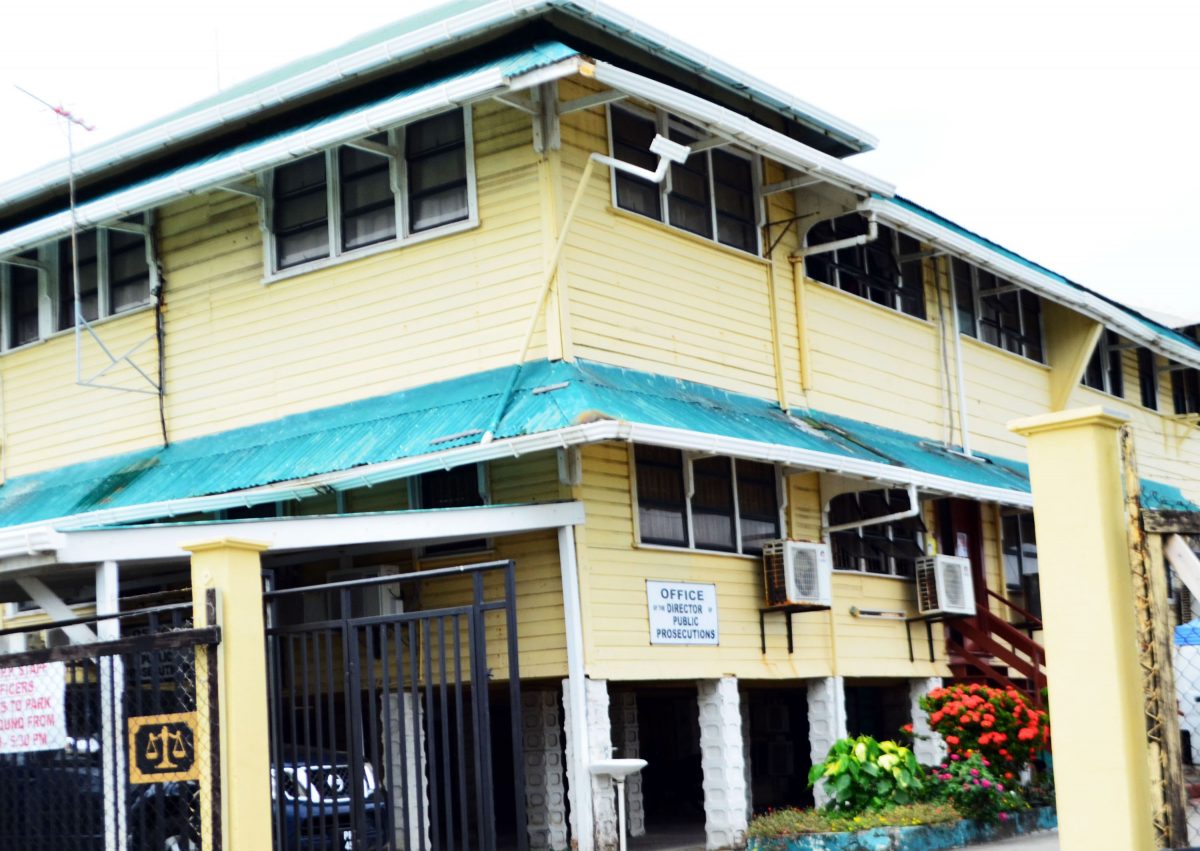The Office of the Director of Public Prosecutions (DPP) has an open-door policy and members of the public are not turned away when visiting to ascertain the status of criminal matters, according to Communications Officer Liz Rahaman, who says all is done to help.
“…You don’t need an appointment to come to these chambers for assistance,” Rahaman told Stabroek Weekend during a recent interview at her office at the DPP’s Chambers’ Eve Leary headquarters. The chambers could see as many as 50 people in any given month looking for assistance on the status of criminal matters.
“Once we can give assistance to any person who walks through that door and we know that they leave these satisfied we are happy. It makes us happy because that is why we are here—to give service to the people,” Rahaman said about the chambers, headed by DPP Shalimar-Ali-Hack.
“We don’t feel good when a member of the public comes in here or calls on the telephone and we can’t assist them,” she said, adding that they don’t ever tell anyone that they cannot be assisted.
Assisting members of the public as they seek justice is something that Rahaman takes personally as she knows how it feels to not get closure. She shared that back on September 10th, 1985 her uncle, Hamid Rahaman, was shot and killed by bandits during a home invasion and the matter was never solved and her and family members have never gotten closure.
According to Rahaman, when a member of the public makes a report to the police about a crime committed, if the file is sent to the DPP’s office for advice and returned for further investigation and the complainant does not receive feedback from the force, the complainant usually finds his/her way to the office.
The complainant is sometimes assisted by agencies such as the Child Care and Protection Agency and non-governmental organisations. The office has a standardized complaint form which is used in all matters and once the relevant information is filled out then a written request would be sent to the Crime Chief requesting the file, Rahaman explained.
There are cases as well when the respective police officer is contacted directly for a status report and feedback may be given almost immediately.
“It is a continuous ball that we roll here. It starts. It continues. It continues and then we give feedback, so nothing is left undone or unanswered,” she said.
In any given month, the office receives a number of files and Rahaman said for last year they received in excess of 3,000 police files.
The office has meticulous ways of manually cataloguing each matter through a logbook which sees the file being logged immediately upon its arrival. This includes the nature of the file, the officer who brought it and the date. Later, the date it leaves is also logged with the name of the officer who uplifts it. When the office returns files these are also logged, along with the names of the officers who receive them and the date.
The logbook, she said, ensures that the office can give account for each file that is taken there.
“It is a tight schedule we run here… The DPP is able to account for every file that she receives from the Guyana Police Force regardless of which police station,” she said.
Asked for a reaction to the many times the DPP is blamed for delays when complainants or the media are told that the file is at the office, Rahaman said that there are times when those files may not yet have reached the office.
And as to whether that happens often, she responded, “It happens more than we would wish for it to happen.”
Understandably, the complainant is looking for justice and closure and Rahman said when they see stories about files being stuck at the DPP’s office they seek assistance in making contact with the complainant and it is taken from there.
“More often than not, I must add, I must make this specifically clear, when the police say the file has gone for legal advice sometimes they mean well and indeed it may have left station A and division to come to the DPP’s office for legal advice. But between this space and that space it has go through a process, it goes through a channel and the minute a complainant hears that it’s gone to the DPP for advice they assume it’s here,” Rahaman further explained.
There are also instances where the file could have been sent to the force’s legal adviser as opposed to the office of the DPP.
But Rahaman maintained that the office checks its system every day in an effort to keep track of all the cases.
Discontinuation of matters
Rahaman noted that under the Constitution, the DPP office does not have a role to investigate any criminal matter; this is done by the police. However, the office comes in as set out in Article 187 of the Constitution, to institute and undertake criminal proceedings against any person before any court, other than a court-martial, in respect of any offence against the laws of Guyana.
Files from the police go to the DPP’s office strictly for legal advice and according to Rahaman while her assistants meet with them to discuss files, Ali-Hack “knows each and every file… regardless if it is a simple larceny matter or regardless if it is a murder matter”.
She explained that if sufficient evidence is not contained in the file for an instruction to be given, the DPP sends it back to the police for further investigation to be done and may also itemize what can aid in the investigation.
The office also take over and continue any such criminal proceedings that may have been instituted by any other person or authority and also can also discontinue at any stage before any judgment is delivered any criminal proceedings instituted or undertaken by the office or any other person or authority.
“The Director of Public Prosecutions plays a vital role in the administration of justice in criminal [cases] or matters. The DPP is the authority vested with the power and responsibility of exercising control over the prosecution of all criminal matters except the institution of court-martial,” a handbook on the functions of the DPP states.
Asked about the course of action taken when requests are made for the discontinuation of a matter, especially in those that involve children who are sexually abused, state prosecutor Natasha Backer said the request has to come from the victim and not the parents. However, she said, it is a process, and it is not a case where someone could just meet with counsel and say they want the matter to be discontinued.
She said it would really go through the police who would interview them and take the relevant statements and even when statements of discontinuation are listed in a file there are several factors that are taken into consideration, such as the age of the child, when it comes to sexual offences.
“So it is not a case of them coming and saying we don’t want to proceed, and we say, ‘oh great we are not proceeding,’” she said.
Rahaman said there are also instances when the DPP would instruct that the victim go through a round of counselling and at the end of that process the matter would be re-examined.
“Because remember at the end of the day, we can’t force them, they have to give the evidence,” Backer noted. “We have the option of still allowing the matter to through the process but when the person is called into the witness box they could stand mute or say they don’t want to testify, and no one could force them to do otherwise.”










